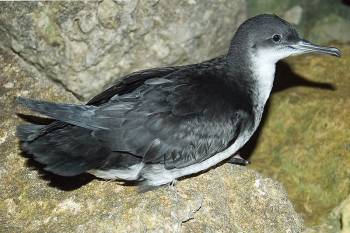Lise Ruffino (Section of Ecology, Department of Biology, University of Turku, Turku, Finland) and colleagues have published in the journal Pest Management Science on a rat and plant eradication programme on a French Mediterranean island that supports a small colony of 8-15 pairs of Vulnerable Yelkouan Shearwaters Puffinus yelkouan – a candidate species for listing within ACAP. A few pairs of Scopoli’s Shearwaters Calonectris diomedea have bred on the island in the past.
The paper’s abstract follows:
“Black rats, Rattus rattus, and mat-forming iceplants, Carpobrotus aff. acinaciformi and Carpobrotus edulis, are pervasive pests on Mediterranean islands. Their cumulative impacts on native biotas alter the functioning of island ecosystems and threaten biodiversity. A report is given here of the first attempt to eradicate both taxa from a protected nature reserve in south-eastern France (Bagaud Island). In order to minimise unwanted hazardous outcomes and produce scientific knowledge, the operations were embedded in a four-step strategy including initial site assessment, planning, restoration and monitoring.
Trapping, which resulted in the removal of 1923 rats in 21 045 trap-nights, made it possible to eliminate a substantial proportion of the resident rat population and to reduce the amount of rodenticide delivered in the second stage of the operation. Forty tons of Carpobrotus spp. were manually uprooted from a total area of 18 000 m2; yet careful monitoring over a decade is still required to prevent germinations from the seed bank.
Two years after the beginning of the interventions, both eradication operations are still ongoing. Biosecurity measures have been implemented to reduce reinvasion risks of both taxa. With the long-term monitoring of various native plants and animals, Bagaud Island will become a reference study site for scientific purposes.”
Yelkouan Shearwater, photograph by Borg Cardona
With thanks to Karen Bourgeois for information.
Reference:
Ruffino, L., Krebs, E., Passetti, A., Aboucaya, A., Affre, L., Fourcy, D., Lorvelec, O., Barcelo, A., Berville, L., Bigeard, N., Brousset, L., De Méringo, H., Gillette, P., Le Quilliec, P., Limouzin, Y., Médail, F., Meunier, J.-Y., Pascal, M., Pascal, M., Ponel, P., Rifflet, F., Santelli, C., Buisson, E. & Vidal, E. 2014. Eradications as scientific experiments: progress in simultaneous eradications of two major invasive taxa from a Mediterranean island. Pest Management Science DOI: 10.1002/ps.3786.
John Cooper, ACAP Information Officer, 07 August 2014

 English
English  Français
Français  Español
Español 